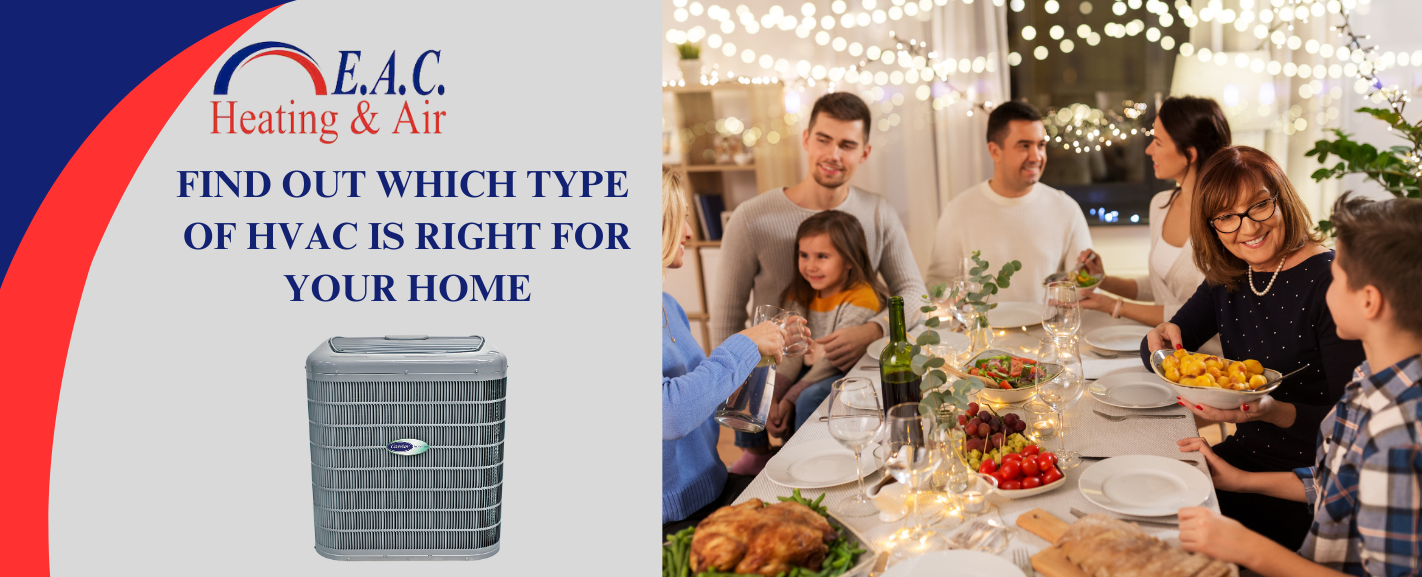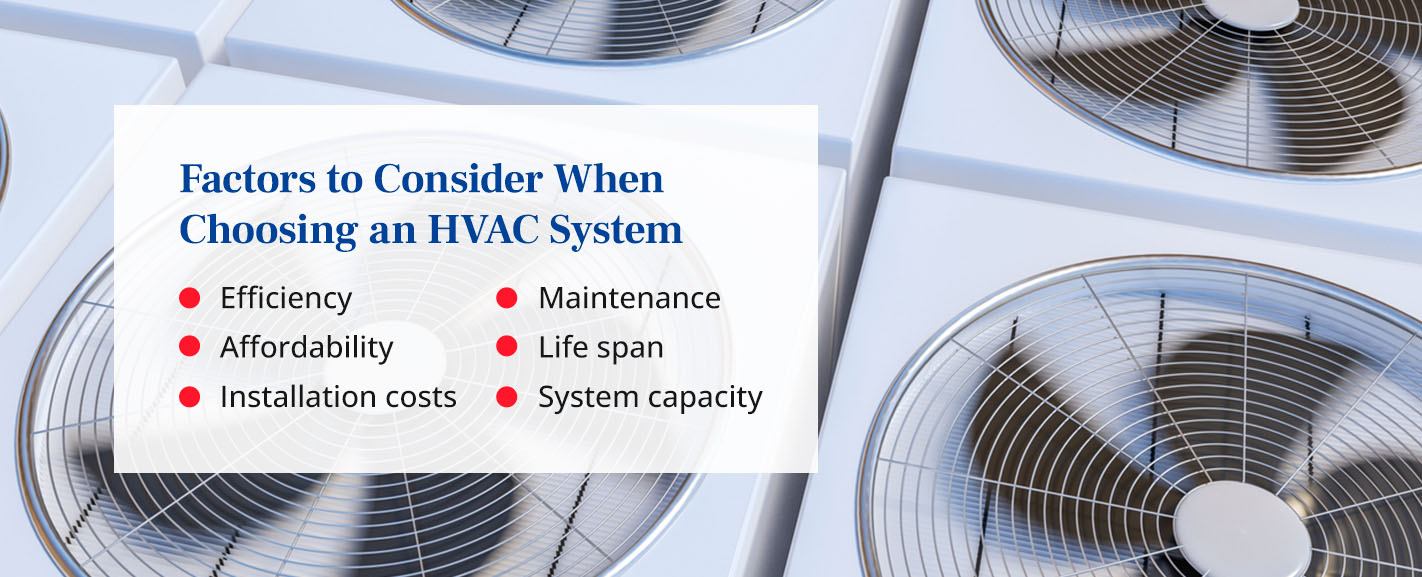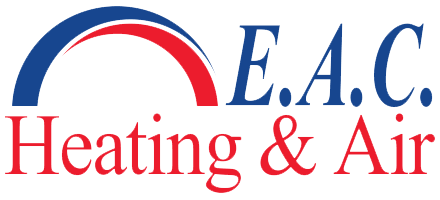
Heating, ventilation and air conditioning (HVAC) systems manage airflow and temperature control inside buildings. Choosing the right type of system for your property and keeping it maintained helps ensure good indoor air quality and comfortable temperatures. Learn about different HVAC types and some factors to consider when you need a new component or system.
Types of HVAC Systems
Here are the most common different types of HVAC systems. E.A.C. Heating & Air offers these components and can help you build the best HVAC system for your home or business.
Traditional Split Systems
Traditional HVAC systems are ducted split systems. This means there are two separate units — one for heating and one for cooling:
- Furnace: One of the most common types of HVAC units is a furnace. These heaters often run on natural gas, though propane and oil furnaces are also available. A furnace heats a set of fins called a heat exchanger. As a blower forces air through the exchanger, it draws heat from the fins. The blower then disperses the warm air through the ductwork. However, heating the air this way dries it out, so you may also need a humidifier.
- Air conditioner: You can find window-mounted, wall-mounted or central air conditioning units connected to ductwork. They all have an indoor component and an outdoor component. Inside, refrigerant runs through the evaporator coils and pulls heat from the air, evaporating the refrigerant. A fan blows the cooled air through the ducts or directly into the room. Outside, the compressor compresses the refrigerant back into a liquid, which heats it, and the exhaust system blows heat away from the compressor. Liquid refrigerant goes back to the coil to start the cycle again.
Both systems are controlled by the same thermostat to keep your home or business comfortable.
Hybrid Split Systems
Hybrid systems are similar to traditional split systems but supplement an electric heat pump with a gas furnace or AC, depending on the climate. Gas furnaces heat spaces more quickly, and air conditioners can reach lower temperatures, but heat pumps are quieter and more efficient.
When it gets too cold or hot for the heat pump to be effective, the furnace or AC takes over. Being able to switch between them gives a home or business owner more control over how they manage their energy consumption and can reduce costs.
Heat Pumps
Heat pumps can be ductless or part of ducted systems. Because they exchange heat between inside and outside air, heat pumps work best in milder climates where there isn’t a lot of seasonal variation. However, they also need a noticeable difference between inside and outside air to work efficiently.
The main advantage of heat pumps is that the same unit handles both heating and cooling, but they have shorter life spans than separate units since they run year-round instead of seasonally. Heat pumps work similarly to air conditioners with a refrigerant that absorbs heat and an exterior compressor, but a heat pump blows both ways depending on whether you’re heating or cooling the interior space.
Ductless Mini-Splits
Ductless mini-splits are a type of heat pump. These smaller electric units do both heating and cooling without significant ductwork. Despite their name, ductless mini-splits still require minimal ductwork to connect the interior and exterior components. Home and business owners can use mini-splits to create zones by installing multiple units in different rooms and controlling each unit independently.

Factors to Consider When Choosing an HVAC System
You’ll need to think about several different factors if you need to choose a new HVAC system or replace an old one. Here are some of the main considerations:
- Efficiency: Furnaces and central AC are relatively efficient. Ductless minis and heat pumps can be very efficient depending on your climate. They aren’t as effective or efficient in below-freezing or extremely high outdoor temperatures. Window and wall ACs generally aren’t very efficient. If you live somewhere with extreme temperatures, heat pumps and mini-splits may not be enough on their own. More powerful, more efficient systems may keep you more comfortable inside.
- Affordability: Weigh the cost to purchase a unit against the cost to run it. A window AC is the most affordable to buy but costs a lot to run because it’s inefficient. In contrast, a central split system has a higher upfront cost — especially if you don’t already have ductwork — but is affordable over time thanks to its long life span and improved efficiency. Often, the best overall option is a heat pump or mini-split. They aren’t the cheapest to purchase but are more cost-effective in the long run because they are more efficient.
- Installation costs: These can vary depending on the time of year. If your AC dies and you need a new one in July, expect to pay more than if you replace the old unit in the early spring. Similarly, furnace installation is likely more expensive during the winter than in the summer or fall, when demand is lower. You may be able to install some window AC units yourself.
- Maintenance: A high-quality HVAC system installed correctly should need minor maintenance. Most systems are reliable and only require regular filter changes. In general, you should have your systems serviced annually to help prevent expensive repairs. Look for an HVAC company that handles installation, maintenance and repairs so they can service your system whether you need a tune-up, replacement parts or a new unit.
- Life span: Generally, more expensive units last longer. Window and wall AC units won’t last as long as heat pumps, central systems or gas furnaces.
- System capacity: How large your building is affects the size of the HVAC system you need. It’s best to consult with an HVAC technician to determine sizing. You might think bigger is better, but getting the wrong size can cost you more through inefficiencies. A system that’s too small will also be inefficient and may run constantly and never get your space to the desired temp. If you have a large building, consider a system with zones so you can control different areas independently.
You might also want to take into account noise, warranties and whether a unit is compatible with programmable thermostats. You might also consider smart features, such as the ability to get filter reminders or change the temperature on your phone.
Get Started With E.A.C. Heating & Air Today!
E.A.C. Heating & Air is a locally owned and operated HVAC company serving Hilton Head Island and the surrounding areas in South Carolina. Since 1981, we’ve provided excellent customer service, including 24/7 emergency services. We repair, maintain and install air conditioning and heating systems of all types for residences and commercial properties. E.A.C. Heating and Air is a trusted Carrier Factory Authorized Dealer.
To schedule service or request a replacement quote, reach out to our experts online, or call us at 843-681-3999 today!

